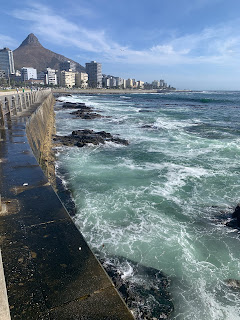WHY WE SHOULD VALUE OUR OCEANS
The oceans
have acted as ‘airbags’ in the slow motion car crash that is climate change. They have absorbed much of the impact and
protected us humans from immediate danger - apart from a 'little' whiplash i.e. heatwaves, floods, droughts and storms.
About 30% of CO2 emissions since the beginning of the industrial revolution have been absorbed by the oceans. So, humans on land have been spared the worst of the impact of atmospheric heating (caused by increased CO2 and other GHG concentrations) that would have otherwise taken place did we not have the oceans.
But this has come at a huge cost :
(1) increased acidification of the ocean (pH has gone from 8.3 to 8.2) it's logarithmic - so actually a 30% increase in acidity, and :
(2) Increased temperature of the oceans – especially in the top layer ( up to 700m depth ) – since the 1970’s the oceans have trapped up to 90% of all excess heat energy trapped by GHG’s. This is about 0.6 degrees C.
What are some of the impact of warming oceans ?
· Warming seas make for more intense storms ( hurricanes, cyclones and typhoons ) and bigger volumes of precipitation.
· Warming seas lead to sea level rise – both directly and indirectly with melting of glaciers and ice sheets accelerating.
These have a major impact on marine life :
Marine life in the upper zone of the oceans which are warming the quickest are very sensitive to temperature change. Corals will bleach and die, oxygen levels will decrease and algal blooms will proliferate - all hugely damaging to this important biome for marine life.
These impacts are exacerbated by the process of acidification and the plastic pollution – with microplastic now being found in all fish sources and consumed by humans.
There will be major economic impacts on communities:
Marine life so affected will have a knock-on effect
on the marine food chain and will impact those fish stocks that humans rely on
for food. So those parts of the world
which are reliant upon fishing for work and food, will be hit hard as these stocks
deplete and food security becomes an issue.
There will also be a loss of human habitat as the oceans rise – with countries
like Bangladesh at great risk.
What are the solutions?
Part of the solution is to create marine reserves to eliminate human activity and allow large areas of the ocean to recover. But clearly the most important thing is for humans to change their behaviour and to reduce carbon emissions (by eliminating the combustion of fossil fuels ) and put in place strategies and technologies for carbon sequestration and capture by removing carbon from the atmosphere or preventing it from going into the atmosphere at source.


Comments
Post a Comment